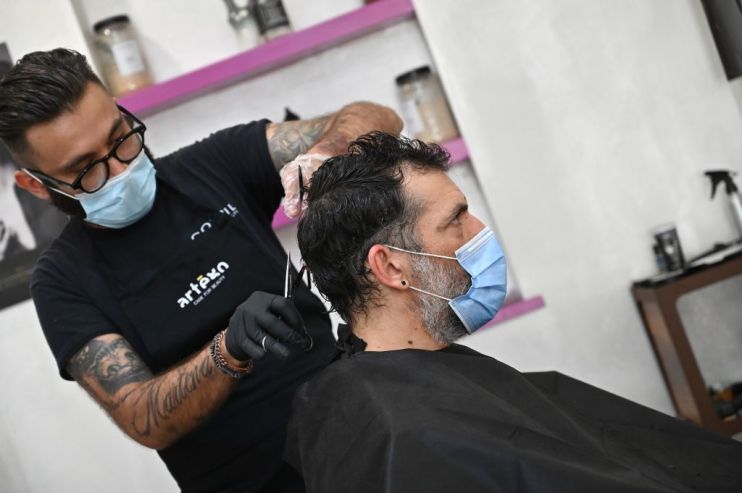Brits rejoice! The era of black market hairdressers is coming to an end

What I am about to tell you will shock you to your very core: there are some people out there walking the streets who have had haircuts.
No, not the ones delivered by unsuspecting partners or housemates with about as much proficiency as a bow-wielding chimp wearing mittens.
No, dear reader, these people have had a clandestine cut. A real-life hairdresser has seen to their hair. It’s been brushed, groomed, cut, and coiffured.
Yesterday, the Prime Minister announced that hairdressers would be permitted to reopen from 4 July. And what a relief that was for the majority of the population.
Since the 23 March, most of us have had to resort to choosing between being a jarhead with home clippers or a hippy like myself, growing long flowing locks in the face of our inability to take the plunge and lop it all off. Foolishly, I had thought this was the extent of the divide in modern Covid Britain.
But no. The real divide is a classic case of the haves and the have nots: those who take the risk and let the bescissored salonistas into their homes, and the rest of us.
In April, BBC Kent rang around 50 local hairdressers and found that 19 were selling treatments against the law. Barred from their high street salons, barbers like them have taken to dating apps and word-of-mouth networks to proffer their services, slipping in and out of houses disguised as carers or tradesmen — like something out of ‘Allo ‘Allo.
I shouldn’t have been surprised, though. This is precisely what happens when markets are restrained but needs remain.
I know, I can hear you cry: hair isn’t a need, and we’re in the middle of a pandemic.
But anyone who has watched Fleabag will know that’s not quite right. Hair is everything.
In this case, it’s a microcosm of the small decisions and the petty criminality many of our fellow citizens have been forced into to flee the mental damage of being locked down far away from the ones we love.
And if you can’t see how a haircut can be a need, your inability to picture the myriad reasons why someone values their hair over the individual risks of this disease is in a way a reflection of your inability to see the possibilities.
You might be heading back to work in a front-facing role. You might be a food worker who can afford twenty quid on a cut but not fifty quid to spend on clippers this month. What if your business relies on image? It might have been your wedding, or the last time you get the chance to speak to elderly relatives. It is easy to see why some might have broken the law to get their hair back on track.
Hairdressers and clients aren’t the only lockdown breakers though. There are plenty of small town black market operations up and running.
Near where I live, there’s a theatre troupe currently running all night raves. A friend notes a speakeasy in Soho. And organised drug gangs have upped prices and reduced purity but kept the rate of supply going across Europe. Black market gloves, masks, and hand sanitizer abound.
Elsewhere in the world, black markets are being set up in more unsavoury affairs. In Pakistan, blood plasma is being sold as a Covid cure-all. But before we get all high-horsed about that, let’s remember that we Brits get our steady supply of blood from the US — we literally leech off American donors because of our refusal to pay those here.
And before they were legalised by a political class in desperate need, there were black market nannies, plumbers, cleaners and builders. The wear and tear of homes suddenly filled with people for days on end took their toll on the plumbing in old Edwardian houses, broken windows needed fixing, building sites left half-done were more dangerous than the virus.
In many ways, the law is catching up with what people were willing to tolerate in the case of our own risks. Support is still there for those that can’t yet ease their own personal lockdowns and we are shielding those most at risk from this disease, but as citizens we are beginning to shift our response in reaction to the evidence. This is a good thing.
Bit by bit lockdown is coming down, but the viral caseload isn’t spiking. In the next couple of weeks we’ll see salons and pubs reopen en masse as it lifts further. That does not mean everything is back to normal, but paradoxically, in some ways the more we ease restrictions, the easier social distancing becomes. More sites legally open means fewer bottlenecks and fewer interactions. Demand for these services will be relieved as supply increases in a regulated and traceable way.
We’ll have moved businesses back from the black market, and hopefully their finances back into the black too. The chances are we will all be safer — and happier — for it.
Meanwhile, let’s remember too that those who got their locks chopped away before Britain’s own Independence Day on 4 July have performed a natural experiment. If there’s going to be a second spike, look for it among those sporting a fancy fringe.
Main image credit: Getty